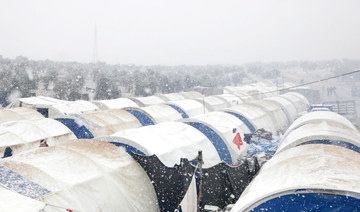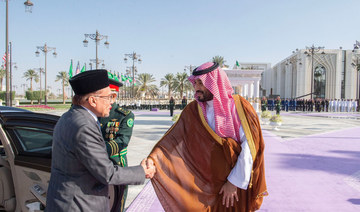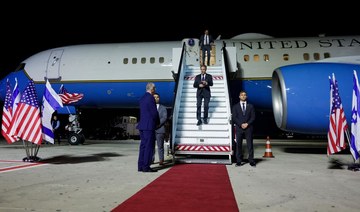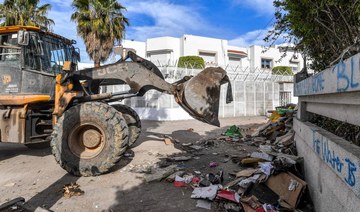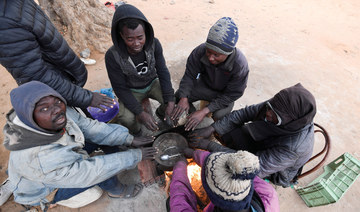NEW YORK: UN human-rights experts on Tuesday urged 57 countries whose nationals are detained in the notorious Al-Hol and Roj detention camps in northeastern Syria to repatriate them “without delay.”
They warned that failure to do so could be tantamount to torture under international law.
The experts raised the alarm about the worsening security situation and deteriorating humanitarian conditions in the overcrowded camps, which are home to more than 90,000 Syrians, Iraqis and “third-country nationals.” Most are women and children with family connections to Daesh fighters.
The majority of residents were moved to the camps in 2019 following the defeat of Daesh in the eastern province of Deir Ez-Zor, the group’s last stronghold. However several thousand have been in Al-Hol since 2016.
“The continued detention, on unclear grounds, of women and children in the camps is a matter of grave concern and undermines the progression of accountability, truth and justice,” said 12 special rapporteurs in a joint statement.
Special rapporteurs are independent experts who serve in individual capacities and on a voluntary basis at the UN’s Human Rights Council. They are not members of UN staff and are not paid for their work.
They painted a bleak picture of life in the camps, where an unknown number of detainees have already died because of the poor conditions. They highlighted high levels of violence, exploitation, abuse and deprivation — and said nations that continue to allow their citizens to be subjected to such conditions might be guilty of torture under international law.
“Knowingly leaving nationals outside the protection of the rule of law is both a possible contravention of the state’s obligations under international human-rights law, and risks being counterproductive,” the experts said.
Fionnuala Ní Aoláin, an Irish lawyer specializing in human rights law, is a special rapporteur on the promotion and protection of human rights while countering terrorism.
She told Arab News: “When you leave thousands of women and children in an arid desert in subhuman conditions, without access to education, health or even the most basic human-rights protections, you create the conditions conducive for radicalization and violence, (particularly among) younger people in the camps, given the lack of exit opportunities for them.
“It does not take a UN human rights expert body for states to understand that. So if states are thinking about their long-term security interests, as concerns their nationals (in the camps), they would repatriate (them). Because if they leave the situation as it is, the danger and the security issues will only increase — not only for the individuals in the camps but for the broader security of the states concerned.”
During the most recent meeting of the Security Council on the humanitarian situation in Syria, members were asked to address this issue of foreign nationals held in the camps. British ambassador Barbara Woodward reiterated that the UK government is opposed to repatriating its citizens from the camps on the grounds that alleged criminals should be prosecuted in the country where the crime took place.
But Ní Aoláin said: “There is zero chance that there will be trials in northeastern Syria. It is obvious to everyone that neither Syria nor Iraq are capable of running the scale and complexity of trials that are involved, if such trials are justified.
“There are deep and profound concerns about fair trials being run in either of those states. And I take it that we do not assume that the non-state actors will be running trials on behalf of the states. So this (the British argument) is an illusionary argument because no trials are forthcoming.
“What it allows certain states to do is to pretend to create a facade of accountability, when the only real accountability for victims of terrorism in Iraq and Syria is the return of those people who have committed such crimes to countries that are capable of running these trials.”
The rapporteurs also raised concerns about the large-scale collection of sensitive, personal biometric data from women and children by the Syrian Democratic Forces in July last year.
“We have concerns that this data was shared with countries of origin and that no consent to the data collection or sharing was given by the women and children who were subjected to it,” said Ní Aoláin.
“We are deeply concerned that the data collection and sharing will be used to further deprive these individuals of certain inalienable rights — including, for example, their rights to citizenship and their rights to be treated equally.”
The experts reminded the 57 states with nationals in the camps that the repatriation process must be carried out in accordance with international human-rights law, they must refrain from exposing individuals to further human-rights violations when they return home, and must actively support their social and psychological re-integration into society.
Ní Aoláin said the list of 57 countries that have failed to repatriate their citizens is “really a list of shame. It speaks to a collective security and human-rights failure by states.”
She added: “States should not want to be on this list — and many states are working actively, including during (the COVID-19 pandemic), to get themselves off this list.
“Some states are making no efforts in that regard but are engaging in what can only be described as pedantic justifications for a policy that is both a failed security policy and the human rights-deficient and morally bankrupt policy of failure to return their most vulnerable citizens to their countries of origin.”
Nations warned of consequences of abandoning citizens in Syrian camps
https://arab.news/bd2qc
Nations warned of consequences of abandoning citizens in Syrian camps
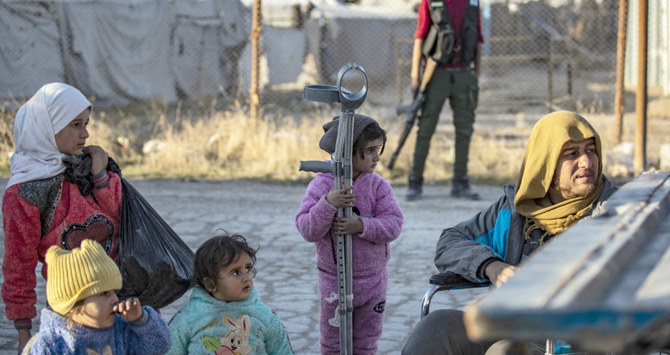
- Human-rights experts say not only are some countries ignoring responsibilities, they are creating the perfect conditions for radicalization
- More than 90,000 people, mostly women and children related to Daesh fighters, live in increasingly desperate conditions in detention camps
UAE delivers 400 tonnes of food aid to Gaza
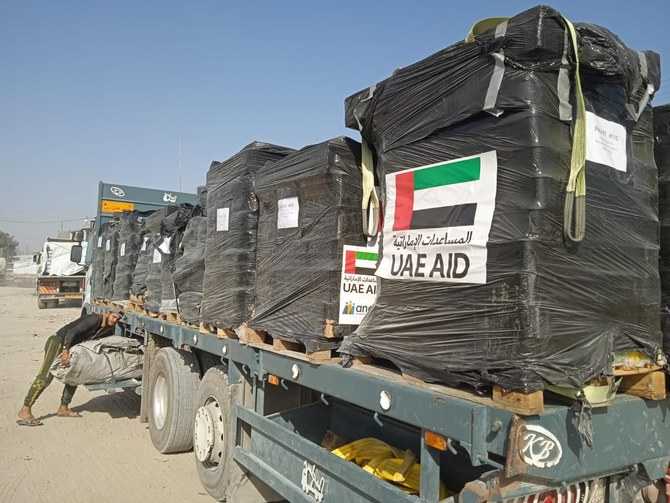
- Delivery, specifically for the northern areas of the enclave, is enough to feed about 120,000 people
DUBAI: The UAE, in partnership with American Near East Refugee Aid, announced on Sunday that it had delivered 400 tonnes of food aid to Gaza.
The delivery, specifically for the northern areas of the enclave, is enough to feed about 120,000 people, Emirates News Agency reported.
Reem Al-Hashimy, Emirati minister of state for international cooperation, said: “The UAE’s safe and successful delivery and distribution of food relief to the Gaza Strip, especially the northern Gaza Strip, marks a significant scaling up in action.”
She continued: “We remain firmly committed to our position of solidarity with the brotherly Palestinian people and alleviating suffering in the Gaza Strip. The UAE, working in parallel with international partners, is determined more than ever to intensify all efforts to ensure that aid lifelines get to those who need it the most.”
Sean Carroll, CEO of ANERA, thanked the Emirati government for its assistance in getting the much-needed aid to the Palestinian people.
“ANERA and the people we serve are extremely grateful for support from the government and people of the UAE, that allows us to deliver this food to northern Gaza, where the needs are so great,” he said.
Last month the UAE allocated $15 million under Cyprus’s Amalthea Fund to bolster aid efforts in Gaza.
Meanwhile, the Gulf country continues to collaborate with international partners and organizations to enable the effective delivery of food and relief via land, air and sea.
To date, the UAE has dispatched more than 31,000 tonnes of humanitarian supplies, including food, relief items and medical supplies, using 256 flights, 46 airdrops, 1,231 trucks, and six ships.
The UAE has embarked on several sustainable relief projects to ensure a consistent supply of food and water to the people of Gaza.
These initiatives include the establishment of five automatic bakeries, the provision of flour to eight existing bakeries, and the installation of six desalination plants with a combined capacity of 1.2 million gallons of water a day.
Malaysian PM condemns West’s ‘sheer hypocrisy’ over Gaza war

- Anwar Ibrahim spoke on a wide range of topics in interview during recent visit to Riyadh
- He pointed out Malaysia had “issued statements to demand that the Gaza genocide must end”
DUBAI: Malaysia takes a strong stance on the war in Gaza and condemns the “sheer hypocrisy” of Western countries over the ongoing Israeli killing of Palestinian women and children, Prime Minister Anwar Ibrahim has said.
Speaking to Katie Jensen, host of the Arab News current affairs program “Frankly Speaking,” during a visit to Riyadh for a special meeting of the World Economic Forum last week, he said that a failure to prevent genocide in Gaza could foster extremism.
“We have issued statements to suggest that their genocide must end,” Anwar said in an interview that can be read in full on page 3.
“And it’s sheer hypocrisy for countries, some countries in the West, including the United States, to deny these continued killings of children and women and civilians.
“Whatever your political position is, I don’t believe that in this period we can condone these sort of inhuman, barbaric acts against fellow human beings. And I think that position is clear. Our position is very strong in that direction.
“I know for an emerging, developing country, it may sound a bit too harsh, but then how do you condone continued killings of women and children? There’s no other way except to at least express in the very strongest terms possible.
“I appreciate the role of the Arab neighbors and Turkiye and Iran and all these other countries trying to do their part. And I think we in Malaysia and many other countries outside the region, too, are expressing gross concern because people are feeling enraged.
“And we don’t want this to prolong, because it will only lead to groups to foster fanatical extremist or terrorist action in the absence of the failure of the international community.”
According to recent reports, the prosecutor of the International Criminal Court may soon issue warrants for the arrest of Israeli Prime Minister Benjamin Netanyahu and Defense Minister Yoav Gallant on charges of deliberately starving Palestinians in Gaza.
If the ICC rules that genocide is taking place in Gaza, Anwar said he would support calls for the arrest of the Israeli ministers.
“I don’t believe that any reasonable person could dispute the incontrovertible effects adduced to support their allegation that genocide has been committed,” he said. “Once it is established that genocide happened, then of course the warrants have to be issued.”
In Kuala Lumpur, a trial is currently taking place after an Israeli national was arrested on March 28 suspected of entering Malaysia to assassinate a compatriot. He was found in possession of six guns and some 200 rounds of ammunition.
The case has raised speculation as to whether the man, named by local authorities as Shalom Avitan, was in fact a spy.
Asked whether any proof had been found connecting the Israeli national to espionage or organized crime, Anwar said investigations were ongoing.
“They have not established the fact that whether this criminal is a spy, but certainly the actions, the movements, the amount of weapons and the link networking within the country is of course concerning,” he said.
“And the authorities are taking tough measures to make sure they get to the bottom of it.”
On whether an independent Palestinian state is likely to come to fruition this year from the ashes of the Gaza war, Anwar said no country — including the US — has the right to deny the resounding global support for Palestinian statehood.
“There are 139 countries that have given recognition to the state of Palestine,” he said. “Now, why must one or two countries consider them above all these considerations and refuse to accept this?
“And to my mind, it is dishonorable to deny the right, not only of Palestinians but of the international community when they decide after years or decades of deliberations, looking at the facts, looking at historical decisions, looking at the precarious position now on the issue of security of the region, issue of economic progress.
“After all these considerations, 139 say, yes, we must recognize the existence of the state of Palestine. I don’t believe any country has the right to deny the sentiments, aspirations of the world.”
Netanyahu says ending Gaza war now would keep Hamas in power
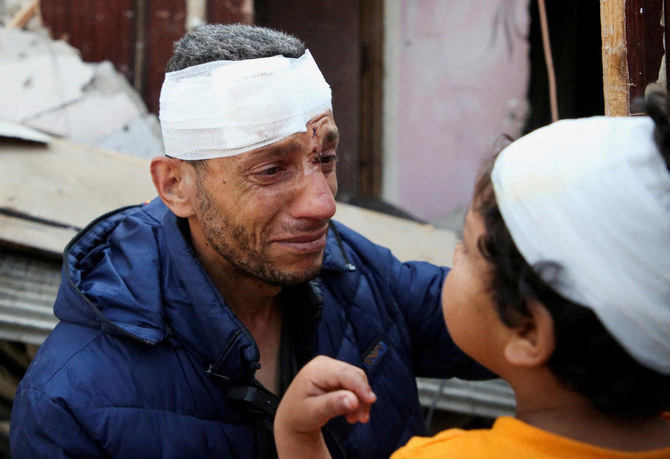
- Israeli leader hardens his rejection of Hamas demands for an end to the Gaza war in exchange for the freeing of hostages
JERUSALEM: Prime Minister Benjamin Netanyahu hardened his rejection of Hamas demands for an end to the Gaza war in exchange for the freeing of hostages, saying on Sunday that would keep the Palestinian Islamist group in power and pose a threat to Israel.
Netanyahu said Israel was willing to pause fighting in Gaza in order to secure the release of hostages still being held by Hamas, believed to number more than 130.
“But while Israel has shown willingness, Hamas remains entrenched in its extreme positions, first among them the demand to remove all our forces from the Gaza Strip, end the war, and leave Hamas in power,” Netanyahu said.
“Israel cannot accept that.”
“Hamas would be able to achieve its promise of carrying out again and again and again its massacres, rapes and kidnapping.”
In Cairo, Hamas leaders held a second day of truce talks with Egyptian and Qatari mediators, with no apparent progress reported as the group maintained its demand that any agreement must end the war in Gaza, Palestinian officials said.
The war began after an assault by Hamas on southern Israel on Oct. 7 in which 1,200 people were killed and 252 hostages taken, according to Israeli tallies.
Israel’s ensuring military offensive has killed more than 34,600 Palestinians, according to the health ministry in the Hamas-ruled Gaza. The bombardment has devastated much of the coastal enclave and caused a humanitarian crisis.
‘Substantial progress’ in Cairo talks on Gaza truce
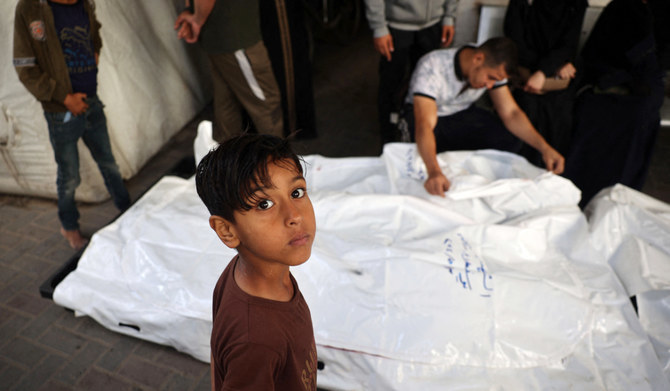
- Hamas delegation, Egyptian mediators discuss prospects for truce in war-riddled Gaza
- Israel has killed over 34,650 Palestinians in Gaza, wounded over 77,000 since Oct. 7
CAIRO: Talks in Cairo involving a Hamas delegation and Egyptian mediators have made substantial progress toward achieving a ceasefire in Gaza, according to a high-ranking source.
The source, who preferred not to be named, told Cairo News Channel that Hamas representatives and an Egyptian security delegation have reached consensus on many contentious points.
Hours before the Hamas delegation’s arrival in Cairo on Saturday, Gen. Abbas Kamel, chief of Egypt’s General Intelligence Directorate, received a phone call from the movement’s leader, Ismail Haniyeh, concerning the negotiations.
Security and political expert Ahmed Mustafa told Arab News: “According to my information, Hamas has agreed to the first phase of the ceasefire deal in Gaza.
“This includes the release of a number of hostages, with the assurance that Israel will fully withdraw from Gaza after 124 days, upon completion of the three stages of the major agreement being coordinated here in Cairo.”
Mustafa also said the Hamas delegation in Cairo is expected to inform the Egyptian side of its agreement with only minor amendments.
“I believe that Hamas has agreed on some terms with the Egyptian mediators now, and previously with the Qatari mediators under American guarantees,” he said.
However, Mustafa said that Israel’s refusal to end the war in Gaza as part of any hostage deal and its determination to eliminate what remains of Hamas remain “major points of contention.”
According to Mustafa, another point of disagreement concerns allowing the entry of dual-use materials into the enclave, for example humanitarian supplies that could also be used for combat purposes, such as fuel.
He said that the first phase, which Hamas “has tentatively agreed upon, will last up to 40 days, during which up to 33 of more than 100 Israeli hostages held in Gaza since Oct. 7 will be released.”
The second phase will last at least six weeks, with both sides agreeing to release a larger number of hostages and prisoners, and also committing to a longer halt to the fighting.
Aboud Jamal, a researcher on Palestinian affairs, told Arab News: “Hamas announced on Friday evening that settlements had been reached, and a delegation from the movement would head to Cairo on Saturday to secure an agreement in a way that meets the demands of the Palestinians.”
Jamal added: “It is clear that the coming days will witness an agreement to cease fire along with the release of some Israeli hostages.
“The only remaining issue is the stance of the Israeli government, which seems to want to prolong the war to maintain (Benjamin) Netanyahu’s government following the recent protests against him in Israel.”
Jamal said the Israeli government stands to benefit by obstructing any agreement.
“So, by sending its delegation to Cairo and discussing its agreement to terms in the prospective deal through mediators, Hamas has preempted the Tel Aviv government, a move for which the movement’s leaders are to be commended.”
He added: “It appears that Egypt truly stands with the Palestinian people and is supportive of reaching an agreement that ensures a ceasefire to save what can be saved of the lives of Gaza’s residents.
“This was evident from the statement issued by Hamas before its security delegation headed to Cairo, stating that Hamas leader Ismail Haniyeh appreciates the role that Egypt is playing.”
Tunisian town gripped by exodus of youth seeking better life in Europe
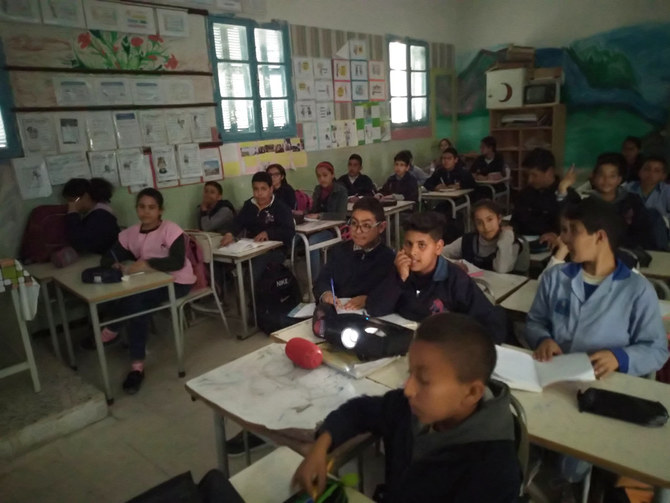
- The struggling town of El Hencha is just 150 kilometers from the Italian island of Lampedusa, a gateway for migrants to Europe
EL HENCHA, Tunisia: When Mohamed Lafi vanished at sea one fateful night, it marked yet another tragedy for a Tunisian town struggling with the exodus of its youth.
Mohamed’s disappearance adds to the deepening despair in El Hencha, situated just 150 kilometers (90 miles) from the Italian island of Lampedusa.
His sister, Ines, stayed behind, confronting the harsh reality that many families face as their loved ones risk everything in search of a better life in Europe.
Mohamed, a 30-year-old taxi driver, left home on the night of January 10 with little more than his mobile phone.
“He went without saying anything to my parents, without a change of clothes, or a bag,” said Ines, 42.
It seemed as though he “was going to meet his friends,” she said.
Mohamed was one of 40 would-be migrants who had boarded a boat — all Tunisians aged between 17 and 30, including a woman and her four-month-old baby.
Despite adverse weather conditions and rough seas, they were determined to set sail, their families said.
More than 1,300 migrants died or disappeared last year in shipwrecks near the Tunisian coast, said the Tunisian Forum for Social and Economic Rights (FTDES) non-governmental organization.
In 2023, Tunisians accounted for the second largest number of irregular migrant arrivals in Italy, at 17,304 people, second only to Guineans at 18,204, Italian government official figures show.
The European Union signed an agreement last year to provide financial aid to debt-ridden Tunisia in return for its commitment to curb migrant departures.
The sense of hopelessness is palpable in Tunisia, whose economy is stagnant with only 0.4 percent of growth in 2023 and unemployment hovering around 40 percent.
The north African country has also been shaken by political tensions, after President Kais Saied orchestrated a sweeping power grab in July 2021.
Those missing from El Hencha, mainly from the middle class, shared a grim outlook for the future, said FTDES.
“Irregular migration cannot be explained only by economic and social factors,” said Romdhane Ben Amor, spokesman for the rights organization.
“The political factor and the feeling of despair of Tunisians who don’t believe in the future of the country” also play a significant role, he added.
Meftah Jalloul, the father of another young migrant, was aware of his son Mohamed’s longing to cross the Mediterranean for a brighter future.
The 62-year-old fishmonger had pleaded with Mohamed to wait for better weather before embarking on his journey.
But the 17-year-old, intent on making the perilous voyage, simply kissed his father on his head and left.
“He wanted money to migrate,” said Jalloul, taking responsibility for providing the funds.
With daily earnings of 20 dinars (about $6), Mohamed Lafi was left with little prospects for building a stable future, said his sister Ines.
“He was unable to make plans or build a house or get married,” she lamented.
Yousri Henchi, a 22-year-old migrant, dropped out of high school and earned a meagre income of 10 to 15 dinars a day working at an Internet cafe.
His uncle, Mohamed Henchi, attributed the allure of Europe to frustrated youths like Yousri being influenced by successful migrants who shared their experiences on social media.
“They see that and want to change their future. They see Europe as a paradise,” he said.
Jalloul had sought to persuade his son, who also quit high school, to undergo vocational training and migrate legally to Italy, France, or Germany.
“He shouldn’t have left without skills or qualifications,” he said. “He could have learnt a trade — plumbing, carpentry, or mechanics.”
Jalloul clings to the hope that the boat Mohamed boarded drifted toward neighboring Libya, although searches there by family contacts have yielded no leads.
“Four months have passed and I am still crying for my son,” he said, overcome with emotion.
Ines Lafi expressed anger toward the person who smuggled her brother’s group, a figure well-known in El Hencha for facilitating clandestine crossings to Italy.
“He had always come back here, but this time, he disappeared without a trace.”
The families have urged Tunisian authorities to bolster economic conditions, educational programs and cultural activities in the town of around 6,000 people to encourage youths to stay.
“We must enhance the industrial zone and create job opportunities for young people,” said Henchi.




